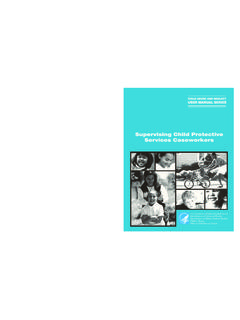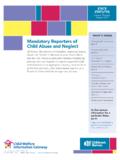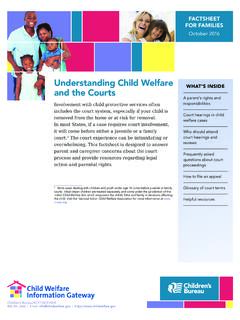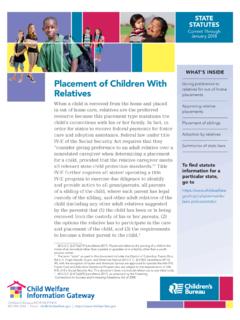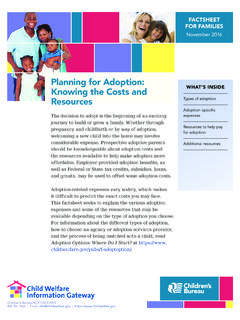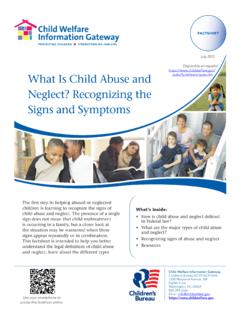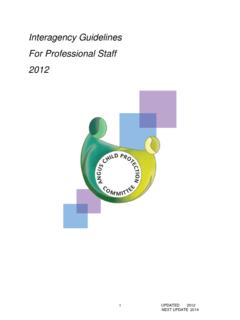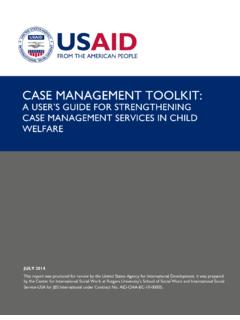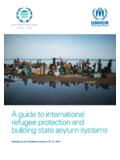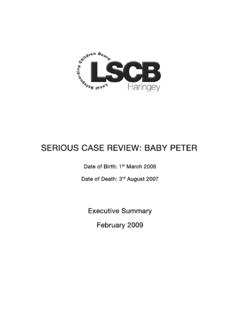Transcription of State Recognition of Intercountry Adoptions …
1 Children s Bureau/ACYF/ | Email: | STATUTESC urrent Through June 2014 WHAT S INSIDEFull effect and Recognition of Intercountry adoption decreesReadoption or validation after an Intercountry adoptionApplication for a birth certificateSummaries of State lawsTo find statute information for a particular State , go to Recognition of Intercountry Adoptions Finalized AbroadIntercountry adoption refers to the adoption of children who are citizens of one country by parents who are citizens of a different country. Intercountry Adoptions may be finalized abroad or domestically. An Intercountry adoption completed abroad is essentially a private matter between the adopting individual or couple and a foreign court operating under that country s laws and regulations. For adoptive parents who are citizens, completing an adoption abroad does not entitle the adopted child to enter the United states .
2 In order for a child who has been adopted abroad to enter the United states , the adoptive parents must fulfill the requirements set by the Citizenship and Immigration Services (USCIS) of the Department of Homeland Security, the foreign country in which the child resides, and sometimes the adoptive parents State of For additional information on these requirements, see adoption Process, Department of State , at ThogugTonTJn2oue0 T1ou04npsT: material may be freely reproduced and distributed. However, when doing so, please credit Child Welfare Information Gateway. Available online at April 2008, rules of the Hague Convention on Protection of Children and Co-operation in Respect of Intercountry adoption apply when an adoption is completed in a country that has ratified the The Hague Convention was ratified by the United states by the Intercountry adoption Act of 2000 ( 106-279) on October 6, 2000, and went into force in the United states on April 1, 2008.
3 For an overview of this process, see Child Welfare Information Gateway s Intercountry adoption From Hague Convention and Non-Hague Convention Countries at Adoptive parents in these cases are required to work with an adoption service provider accredited by the Department of State to guide them through the process of obtaining an IH-3 visa. Children under age 18 automatically acquire citizenship upon entering the United states on an IH-3 visa. Children whose Adoptions are completed in a country that has not ratified the Convention must qualify as orphans as defined by the Immigration and Nationality Act (INA) before they can be considered for permanent residence or citizenship. When citizens fully finalize the adoption of a foreign-born child abroad in a non-Hague Convention country, they must apply to the USCIS to obtain an IR-3 visa for the child, which classifies the child as an immigrant and provides the child with citizenship upon arrival into the United states .
4 The immigration procedure is different for Hague and non-Hague Intercountry Adoptions that are finalized after the child arrives in the United The website of the Department of State , Bureau of Consular Affairs, Intercountry adoption provides information on visas and citizenship processes for children who have been adopted through Intercountry adoption : The information provided includes procedures for children adopted abroad and for children adopted after they have entered the United states . Full Effect and Recognition of Intercountry adoption DecreesOnce the child is in the United states , Recognition and validation of the adoption is subject to the laws of the parents State of The State of residence is the State that the adoptive parents live in and call home. Determining a military family s State of residence may be complex because the family may relocate often.
5 For additional information about military families seeking to adopt and determining their State of residence, see the Information Gateway factsheet Military Families Considering adoption at Approximately 29 states , the District of Columbia, Guam, and the Northern Mariana Islands give full effect and Recognition to an adoption decree that has been issued in full compliance with the laws of the United states and the country that granted the adoption ,55 The word approximately is used because states frequently amend their laws. This information is current through June 2014. The states that currently provide full Recognition to foreign adoption decrees include Alaska, Arkansas, California, Delaware, Florida, Georgia, Hawaii, Idaho, Illinois, Indiana, Iowa, Kansas, Kentucky, Maryland, Massachusetts, Michigan, Missouri, New Hampshire, New Jersey, New Mexico, Ohio, Oklahoma, Oregon, South Dakota, Texas, Utah, Vermont, Virginia, and West Virginia.
6 Although some of these states place conditions on full effect and Recognition of foreign For example, California provides full faith and credit only for Adoptions finalized in Hague Convention countries. Wisconsin provides full faith and credit only for Adoptions finalized in Canada or Adoptions granted by a federally recognized Indian Tribe. In Hawaii and Maine, full Recognition of a foreign decree is discretionary with the court with adoption jurisdiction, while Kansas and Idaho require the foreign decree to be filed with their State courts. Massachusetts grants full Recognition to foreign decrees as to inheritance matters. Illinois and Iowa require postplacement investigations to ensure that the adoptive family is meeting the child s needs. Recognition of a foreign adoption decree means that the decree is considered by the State to be as valid and binding as a decree issued by a State or Validation After an Intercountry adoption Many states provide for validation of the foreign adoption or readoption of the child under State law.
7 Validation is the process of submitting an adopted child s foreign adoption decree for State court The State court must be a court that has jurisdiction over adoption cases. For more information, see Information Gateway s Court Jurisdiction and Venue for adoption Petitions at Readoption is the process of adopting a child who had been adopted in another jurisdiction. The processes are similar; both involve State court review and legitimization of the foreign adoption . The processes typically require adoptive parents to provide the court with certain documents, including a certified translated copy of the foreign adoption decree, proof of the date and place of the adopted child s birth, and proof that the child has an IR-3 five states and Puerto Rico require adoptive parents either to petition the court for validation or file or register the foreign adoption or foreign adoption ThogugTonTJn2oue0 T1ou04npsT: material may be freely reproduced and distributed.
8 However, when doing so, please credit Child Welfare Information Gateway. Available online at Kansas, Kentucky, Louisiana, Pennsylvania, and South Carolina. Approximately three states require adoptive parents to readopt the child under certain California requires readoption if it is required by the Department of Homeland Security. Kentucky and Pennsylvania require readoption if the adoption was not finalized abroad properly. Approximately 24 states and the District of Columbia offer readoption or validation as an option and not a Arizona, California, Colorado, Connecticut, Delaware, Georgia, Maine, Maryland, Minnesota, Missouri, New Hampshire, New Jersey, New York, North Carolina, North Dakota, Ohio, Oklahoma, Oregon, Pennsylvania, Tennessee, Texas, Utah, West Virginia, and Wisconsin.
9 Readoption or validation protects the adoption finalized abroad from a legal challenge in State court and ensures the adopted child s ability to inherit from an adoptive parent. Also, readoption or validation provides the adopted child with an opportunity to obtain a birth certificate from the parent s State of for a Birth CertificateApproximately 33 states , the District of Columbia, Guam, the Northern Mariana Islands, and Puerto Rico require adoptive parents to submit documentation from readoption or validation of a foreign adoption in a State court when they wish to request that the State Registrar of Vital Statistics issue a State birth certificate for the adopted Alabama, Alaska, Arizona, Arkansas, California, Colorado, Connecticut, Delaware, Georgia, Hawaii, Idaho, Kansas, Louisiana, Maine, Minnesota, Mississippi, Missouri, Montana, Nebraska, Nevada, New Hampshire, North Dakota, Oregon, Pennsylvania, South Carolina, South Dakota, Tennessee, Texas.
10 Utah, Vermont, Washington, West Virginia, and Wisconsin. Approximately 13 states and the District of Columbia will accept the foreign adoption decree when adoptive parents request a birth certificate for their adopted Illinois, Maryland, Michigan, Missouri, New Jersey, New Mexico, New York, North Carolina, Ohio, Oklahoma, Rhode Island, and Virginia. Usually, the request for a birth certificate is accompanied by a certified copy of the final adoption decree, the State court s findings of fact as to date and place of birth, and a written request for a new birth certificate for the adopted Findings of fact are court determinations about questions vital to a legal proceeding, such as facts about an adopted child, that are necessary for a readoption in State court. Adoptive parents may adopt a foreign-born child whose date and place of birth are unknown or seem incorrect.
